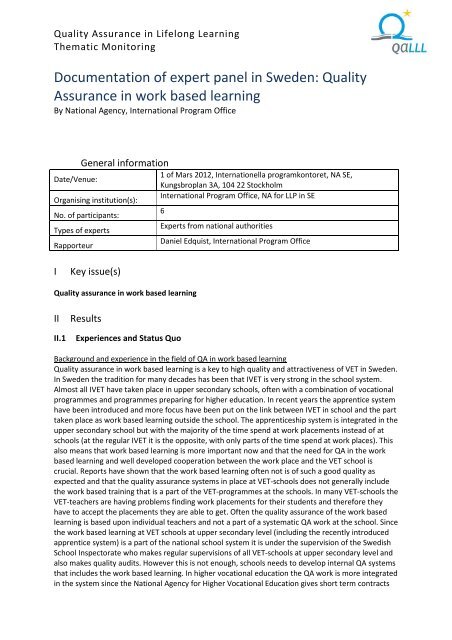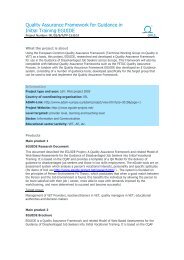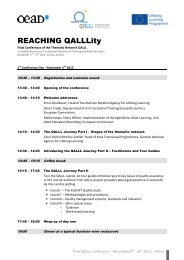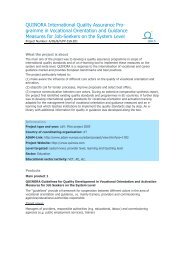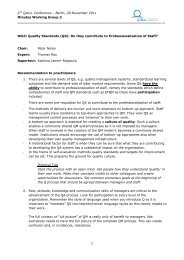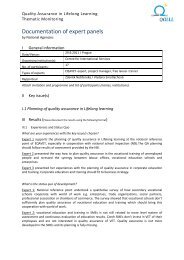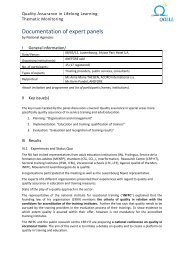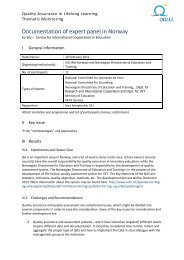Create successful ePaper yourself
Turn your PDF publications into a flip-book with our unique Google optimized e-Paper software.
Quality Assurance in Lifelong Learning<br />
Thematic Monitoring<br />
<strong>Documentation</strong> of expert panel in Sweden: Quality<br />
Assurance in work based learning<br />
By National Agency, International Program Office<br />
Date/Venue:<br />
General information<br />
Organising institution(s):<br />
No. of participants:<br />
Types of experts<br />
Rapporteur<br />
I Key issue(s)<br />
Quality assurance in work based learning<br />
II Results<br />
II.1 Experiences and Status Quo<br />
1 of Mars 2012, Internationella programkontoret, NA SE,<br />
Kungsbroplan 3A, 104 22 Stockholm<br />
International Program Office, NA for LLP in SE<br />
6<br />
Experts from national authorities<br />
Daniel Edquist, International Program Office<br />
Background and experience in the field of QA in work based learning<br />
Quality assurance in work based learning is a key to high quality and attractiveness of VET in Sweden.<br />
In Sweden the tradition for many decades has been that IVET is very strong in the school system.<br />
Almost all IVET have taken place in upper secondary schools, often with a combination of vocational<br />
programmes and programmes preparing for higher education. In recent years the apprentice system<br />
have been introduced and more focus have been put on the link between IVET in school and the part<br />
taken place as work based learning outside the school. The apprenticeship system is integrated in the<br />
upper secondary school but with the majority of the time spend at work placements instead of at<br />
schools (at the regular IVET it is the opposite, with only parts of the time spend at work places). This<br />
also means that work based learning is more important now and that the need for QA in the work<br />
based learning and well developed cooperation between the work place and the VET school is<br />
crucial. Reports have shown that the work based learning often not is of such a good quality as<br />
expected and that the quality assurance systems in place at VET-schools does not generally include<br />
the work based training that is a part of the VET-programmes at the schools. In many VET-schools the<br />
VET-teachers are having problems finding work placements for their students and therefore they<br />
have to accept the placements they are able to get. Often the quality assurance of the work based<br />
learning is based upon individual teachers and not a part of a systematic QA work at the school. Since<br />
the work based learning at VET schools at upper secondary level (including the recently introduced<br />
apprentice system) is a part of the national school system it is under the supervision of the Swedish<br />
School Inspectorate who makes regular supervisions of all VET-schools at upper secondary level and<br />
also makes quality audits. However this is not enough, schools needs to develop internal QA systems<br />
that includes the work based learning. In higher vocational education the QA work is more integrated<br />
in the system since the National Agency for Higher Vocational Education gives short term contracts
<strong>Documentation</strong> of expert panel in SE<br />
to the promoters of higher VET where QA is an important task. In higher VET the involvement of the<br />
local business sector is also regulated where they have to be represented in the board of the school.<br />
The National Agency for Higher Vocational Education also follows up the employability and measures<br />
the numbers of students having a job after a certain time after graduating. This in combination with<br />
that the students that are adults generally are having high demands on the quality in the work based<br />
learning makes the QA in work based learning better.<br />
II.2 Challenges<br />
There are several challenges in IVET when it comes to QA in work based learning:<br />
• Weak tradition of apprentice system in Sweden is a challenge when this system is being<br />
introduced and is growing.<br />
• Many VET schools are having problems in recruiting work placements for their students and<br />
thus are afraid of having high demands on the companies/organisations offering placements.<br />
At the same time according to a study made on the apprentices system in Sweden the<br />
companies/organisations involved would like to have more information about what is<br />
expected from them.<br />
• The IVET schools often work in a fierce competition when it comes to recruiting students.<br />
This can be a problem when it comes to what kind VET programmes they are offering.<br />
Programmes that are popular but where the need on the labour market is low can be hard<br />
not to offer (otherwise the school might lose potential students and thereby necessary<br />
incomes). This can come in conflict with an important quality indicator in VET; the<br />
employability.<br />
• VET teachers are often the ones working with the work based learning form recruiting the<br />
placement and matching it with the student to assessing and evaluating the work based<br />
learning. In many cases the VET teachers are not having enough time for this and thus not<br />
being able to work with QA of the work based learning in a satisfactory way, from the<br />
planning phase to monitoring the students, evaluating and reviewing it. It can also<br />
sometimes be a conflict when it comes to VET teachers working with QA of the work based<br />
learning since they often are very loyal with the work places and are having a background<br />
and are sharing the values of the sector rather than the school.<br />
• QA must not be only external evaluation and a kind of “beauty contest”, it must involve the<br />
whole organisation and be used as a tool for improvement.<br />
II.3 State of the art and good practices<br />
• Looking at countries with long traditions of work based training as the most important part<br />
of IVET such as Denmark with an apprentice system seen as attractive and with high quality<br />
can inspire and give good ideas.<br />
• Many schools are following up the numbers of students being employed after graduating, it<br />
would be a good quality criteria if all schools had to do that.<br />
• The reformed IVET system in Sweden (implemented in 2011) creating national and local<br />
programme councils with broad representation from different industries, professions and<br />
authorities can be a good way of working with QA in work based learning. This will create<br />
institutionalized dialog between the representatives for the school system and the<br />
industries. It will be an instrument of working with QA at national level of the vocational<br />
programmes. The local councils will act as intermediaries between the municipality, VET<br />
provider and the workplaces and can be an instrument for QA of the work based learning at<br />
local level.<br />
2
<strong>Documentation</strong> of expert panel in SE<br />
• In some industries/sectors there is a long tradition of good cooperation between the VET<br />
providers and the industries, i.e. the construction industry and the health care sector. This<br />
creates good opportunities for mutual trust and understanding.<br />
• The course based syllabus with the work based learning integrated is, when the cooperation<br />
between the VET school and the work placement works well, a quality assurance that the<br />
work based learning is in line with the needs of the educational system. Since the industries<br />
and sectors have been involved in making the new course based syllabuses this will also be in<br />
line with the needs of the industry.<br />
• In higher VET the National Agency for Higher Vocational Education have developed material<br />
for mentors at work placements.<br />
• Models set up at national level between stakeholder in the industry and VET providers<br />
aiming to increase the quality and attractiveness in certain VET sectors that are successful<br />
exists. These models focus on cooperation and QA at local or regional level between VET<br />
providers and local industry and municipalities and local stakeholders. Many of these local<br />
competence centres are successful in working with QA in work based learning. Examples of<br />
this are the so called “Teknik college” (that the Council of Swedish Industry have been<br />
developing at national level) and “Vård college” in technical industry and health care sectors.<br />
This could be developed and spread to other sectors.<br />
• Examples of good practices European projects in Sweden are two project in LdV TOI that<br />
have been working with QA in work based learning abroad (a projects coordinated by<br />
Göteborgsregionens Tekniska College called: Internship to industry, I2i) and self evaluation<br />
system for adult and higher VET developed by looking at successful existing QA systems (a<br />
project coordinated by Folkuniversitetet in Uppsala called CQAF in (A)VET).<br />
II.4 Recommendations<br />
Training programmes and information material for the mentors at the work placements should be<br />
developed. The National Agency for Education are going to develop strategies and training<br />
programmes for this. The training for the mentors should be at different levels (from short material<br />
produced for self learning to more ambitious programmes) and adapted to different<br />
industries/sectors. Flexibility is necessary since the persons and organisations involved vary a lot as<br />
well as the needs of different sectors. Raising the competence among the mentors is crucial, both<br />
about the role of the mentor and about the training needs and the course syllabuses. A good<br />
example is the health care sector where staff at all levels has been mentors and there is a well<br />
established system for mentorship (for all types of students from VET students to medical students).<br />
When work based learning is getting more important and there is a need to raise the quality in the<br />
work based learning it might be good to look at incentives to make companies and organisations<br />
more interested in offering high quality work placements for VET students by paying them for this. It<br />
also makes it easier to demand high quality in the work based learning and to have higher<br />
expectations on mentors and closer cooperation with the VET schools when companies are paid for<br />
this. A good example is the Danish system where the all companies pay to a fund from which the<br />
company that offers apprentices gets money. This increases the responsibility from the companies<br />
and makes sure that some companies are not free riders.<br />
There must be a holistic approach that the work based learning and the school based learning is<br />
integrated. The work based learning cannot be seen as something separated from the school and<br />
have to be integrated in the QA systems at schools. The needs from the school (i.e. as stated in the<br />
syllabuses) must be “interpreted” to the mentor at the work placement and the connection between<br />
the syllabuses and the work based learning must be strong. Today the system is good but in reality it<br />
does not always work. Mutual trust must be created between the VET providers and the companies<br />
offering work placements. Schools must be clear in their expectations on the work placement, the<br />
needs for learning must be agreed upon and related to the syllabuses. In this the VET teachers<br />
3
<strong>Documentation</strong> of expert panel in SE<br />
responsible are the key to creating the understanding, monitoring and follow up the work based<br />
learning.<br />
Spread and develop existing systems for cooperation between VET providers and companies (i.e. the<br />
so called Teknikcollege and Vårdcollege) that works successfully with QA in work based learning. VET<br />
providers are given a quality label after having been certified by special QA standards. The new<br />
model with local programme councils with broad representation from VET providers industries,<br />
professions and authorities should be further developed and given mandate to work with QA in work<br />
based learning.<br />
Special quality marks given to companies offering good quality work placements could make<br />
companies more motivated to work with quality in work based learning and to cooperate with the<br />
VET schools. Another example is quality labels given from the industry/sector to schools that are<br />
having a good cooperation with them and that are offering VET of good quality.<br />
Continue to work with QA in work based learning by supervisions of the National School inspectorate<br />
where the work based learning is important to look at in the inspections. This also forces the<br />
management of the schools and the municipality in charge to be involved in the QA and to work with<br />
strategies. However external inspections is not enough and must be complemented with internal self<br />
assessment systems that are seen as tools for quality development that involves all staff and that not<br />
are seen control systems. Otherwise it will not lead to an internal process with improved quality and<br />
it will be more of a “beauty contest” where schools are afraid of showing weaknesses and problems.<br />
Self evaluation QA systems must be the core of QA and QA must be a tool for development and not<br />
just a system for control.<br />
Develop QA systems for VET providers that are easy to use and that involve the VET teachers. The<br />
teachers must have tools to work with QA in work based learning in a systematic way. Make sure<br />
that the VET teachers have time to work with QA of the work based learning in all phases of the QA<br />
circle. The planning phase is critical and must involve the companies offering work based learning<br />
and a dialog of what is expected of them. Learn from the industries/sectors that are having a well<br />
developed cooperation between the VET providers and the industries, i.e. the construction industry<br />
and the health care sector. The involvement of the industry must be strong and there must be a<br />
commitment of working with QA together.<br />
At a European level it is important for countries as Sweden to be able to learn from systems with<br />
long traditions of apprentice systems both on a system level and on provider level. Projects on<br />
European level with focus on QA in work based learning should be supported and promoted.<br />
Opportunities for providers, teachers and mentors in VET should be given to develop new methods<br />
and learning from good practice.<br />
III Additional comments<br />
IV Annex<br />
List of participants<br />
Staffan Bolin, Swedish National Agency for Higher Vocational Education, responsible for supervision<br />
and quality assurance.<br />
Lotta Naglitsch, National Agency for Education, responsible for the Construction programme<br />
Björn Sterner, National Agency for Education, responsible for Hotel and restaurant programme<br />
Peter Holmberg, Swedish School Inspectorate, responsible for quality assurance in apprenticeship in<br />
IVET<br />
4
<strong>Documentation</strong> of expert panel in SE<br />
Bengt Landfeldt, International Program Office (NA SE), responsible for Europass and ECVET team<br />
coordinatordinator<br />
Daniel Edquist, International Program Office (NA SE), coordinatordinator for Leonardo da Vinci.<br />
Any further relevant documents<br />
Seminar on QA in work based learning at the VET conference arranged by International<br />
Program Office on the 8-9 of December<br />
Programme:<br />
• Introduction and presentation of the theme and of <strong>QALLL</strong>, Daniel Edquist, International<br />
Programme Office<br />
• Presentation of Swedish School inspectorate and their regular supervisions of all VET-schools<br />
at upper secondary level and their quality audits. Presentation of the EQAVET<br />
implementation in Sweden, Malin Söderberg, Swedish School Inspectorate.<br />
• Presentation of the LdV TOI projects CQAF in (A)VET, Ali Rashidi, Folkuniversitetet Uppsala<br />
• Discussions in groups about QA in work based learning.<br />
Short summary of the discussions on QA in work based learning:<br />
• The new national and local programme councils IVET implemented in 2011 can be a very<br />
successful way of working with QA in work based learning.<br />
• Learn from higher VET were QA in work based learning is built in the system and QA is an<br />
important task for the National Agency for Higher Vocational Education.<br />
• Avoid advanced QA systems, instead develop systems that are easy to use and that involve<br />
teachers and not just some QA managers. Don’t measure too much and don’t focus too<br />
much on statistic. See QA as a tool for continuous improvements. Use systems that are<br />
flexible and can be adapted to different sectors and different types of VET promoters.<br />
• Cooperation between the world of work and VET institutions is a key to good quality in work<br />
based learning.<br />
• Some VET teachers feels that there might be problems getting work placements if the<br />
national authorities (i.e. the National School Inspection) have to high demands on the work<br />
placements in order to raise the quality on the work based learning.<br />
5
<strong>Documentation</strong> of expert panel in SE<br />
Workshop om kvalitetssäkring inom yrkesutbildning 2011-12-08<br />
• Introduktion av Daniel Edquist, Internationella programkontoret.<br />
• Malin Söderberg, Skolinspektionen, berättar kort om hur de arbetar med<br />
kvalitetssäkring inom yrkesutbildning<br />
• Ali Rashidi, Folkuniversitetet, presenterar ett europeiskt projekt finansierat inom<br />
ramen för Leonardo da Vinci vidareutvecklingsprojekt om kvalitetssäkring inom<br />
yrkesutbildning.<br />
Efter den inledande presentationen kommer huvuddelen av workshopen att ägnas åt<br />
diskussioner om kvalitetssäkring inom yrkesutbildning för att reflektera över vad som<br />
fungerar bra och vilka problem som finns. Vi hoppas på ett givande erfarenhetsutbyte<br />
utifrån projektpresentationen och nedanstående frågor:<br />
· Vad fungerar bra när det gäller kvalitetssäkring inom yrkesutbildning i allmänhet och<br />
APL/LIA i synnerhet, utifrån era erfarenheter (tänk på alla fyra faserna i<br />
kvalitetshjulet och hur det kan användas för att arbeta med ständiga<br />
förbättringar)?<br />
· Vad fungerar inte bra/vilka är de stora problemen/svårigheterna när det gäller<br />
kvalitetssäkring inom yrkesutbildning i allmänhet och APL/LIA i synnerhet,<br />
utifrån era erfarenheter (tänk på alla fyra faserna i kvalitetshjulet och hur det<br />
kan användas för att arbeta med ständiga förbättringar)?<br />
· Är självutvärdering en bra metod och behöver den kompletteras med extern<br />
utvärdering?<br />
· Finns det speciella saker att tänka på/utmaningar när det gäller kvalitetssäkring av<br />
internationell APL/APU och LIA?<br />
Anteckna gärna ner några punkter från varje grupps diskussion.<br />
6
<strong>Documentation</strong> of expert panel in SE<br />
List of participants on the seminar; QA in work based learning 8 of December 2011<br />
Lotta Nilsson Yrkeshögskola Hälsingland<br />
Lena Flodin<br />
Frans Schartaus<br />
Handelsinstitut<br />
Pontus Clarin Dragonskolan<br />
Annika Eriksson Birgersjöberggymnasiet<br />
Karin Jönsson<br />
Yrkeshögskolan Eslövs<br />
kommun<br />
Inger Löfberg Regionförbundet Jämtland<br />
Ewa<br />
Westman-<br />
Magnusson Regionförbundet Jämtland<br />
Cecilia Lindhe Nadjalin JB Kompetens<br />
Denise Holgerman Nackademin AB<br />
Per Bergman Miroi i-learning AB<br />
Anders Wass<br />
Borås stad<br />
Viskastrandsgymnasiet<br />
Sven Salin Vis/tidningen KOM<br />
Maria Carlsson CVÖ/Cityakademin<br />
Eliza<br />
De Bernardo<br />
Norman Påhlmans Handelsinstitut<br />
Britt-Marie Fahlström-Spiik Kalix Univercity - Komvux<br />
Marie Eklund Kalix Univercity - Komvux<br />
Sara Hammarström Realgymnasiet<br />
Maria Bornhede Realgymnasiet<br />
Marit Norin Älvdalens Utbildningscentrum<br />
Marie Bjelksäter Malmö Yrkeshögskola<br />
Frida Lundkvist Richard Steffengymnasiet<br />
Ann-<br />
Charlotte Havner Hvitfeldtska gymnasiet<br />
Östen Lindbäck Högskolan på hemmaplan<br />
Peter Holmberg Nationella lärlingskommittén<br />
Ingela Andersson<br />
Uddevalla<br />
Gymnasieskola/Göteborgs<br />
Universitet<br />
Sara Kullgren<br />
Utredningen om<br />
lärlingsprovanställning<br />
Göran Bohman Sågbäcksgymnasiet<br />
7


